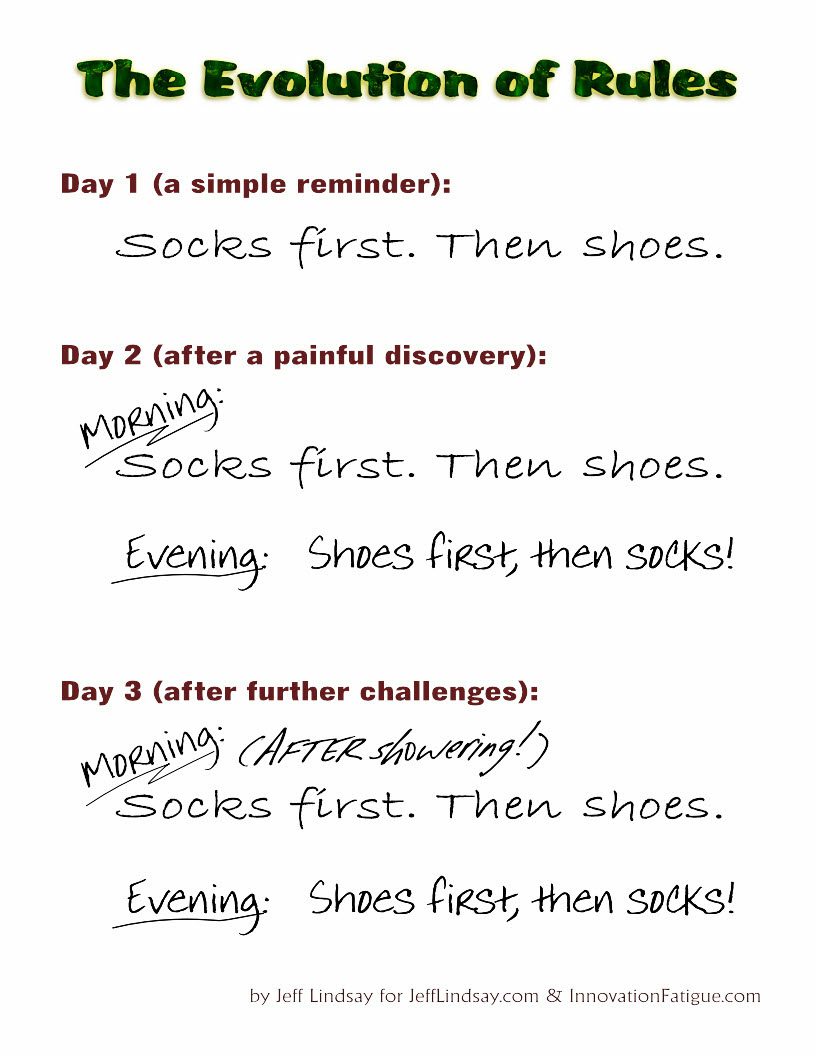Rules that seem simple and logical can become problematic when rigidly applied or applied without understanding the principles behind them. Something to keep in mind. Without a focus on principles, rules may be abandoned or become overly complex as they evolve.
Rules can help reinforce principles, but success requires mastering and living true principles, not just a patchwork of rules.
What has worked for you in teaching rules and principles to your children or to others?










Brainwhasing. I gave my kids scenarios and ways to handle them from the time they were old enough to understand. For example, on smoking: I told them all the usual reasons it was bad to smoke, but said the best reason not to smoke was because when they were in a situation when they couldn't smoke, it was worse than being hungry but they couldn't eat. Brainwashing works wonders.
I think that, sometimes, we're our own worst enemies. We often tend to be highly critical of each others' efforts to master true principles–it's not enough that someone's practicing the Word of Wisdom, they're doing so for the "wrong" reasons. Recently, on my own blog, I described my personal testimony of why drinking coffee isn't, in fact, such a good idea. I got the sense, from one of the comments, that at least one reader, anyway, thought I'd made a mistake. Apparently, I'd arrived at my conclusion by the wrong path so, potentially, it wasn't valid.
All too often, our efforts to personally apply rules–which are, in effect, our individual testimonies of those rules–are met with something akin to, "don't think for yourself, read the handbook". And then we wonder why people have a problem with the church.
Your post reminded me of a story my grandfather used to tell: A boy goes away to camp. His mother tells him to put on new socks every day. By Thursday he can't get his shoes on!
I've been parenting for nearly 30 years, and I've learned (slowly) the value of "why". My kids were much more likely to live by my rules when they understood why those things were important to me. (It wasn't a guarantee, and I've had my share of rebelious kids, but knowing the WHY has made a big difference.
This is actually very Buddhist. In Buddhism, the principle is more important than the rule.
Relating it to the Word of Wisdom examples given, one maxim in Buddhism is "Avoid intoxication". Interpretation is up to the person. Many Buddhists don't drink alcohol at all. Others might have a glass of wine, but avoid becoming intoxicated. But it's beyond alcohol. It can relate to anything intoxicating – drugs, too much caffeine, or really anything.
In my mind, it is a higher principle than how we treat the Word of Wisdom. By making a person more personally responsible for the "rules", it avoids the check-box mentality so prevalent in our religion.
Jesus actually says that the principle is more important than the rule, too (particularly in Matthew, this idea comes up over and over again). Unfortunately, it's been my experience that sometimes, and to varying degrees, we all tend to forget this. Why we do things matters, and bears investigation.
CJ:
I agree that is what Jesus taught. There is a higher principle. Unfortunately, our Church, for whatever reason, has become caught up in the minutiae of rules that it seemed the Jews added to the Law.
Again, keeping the examples simple: everyone, LDS or not, agrees that alcoholism is bad. I am sure that Christ wasn't an alcoholic, yet he drank wine. Same with Joseph Smith. They understood the "principle" of avoiding intoxication. This has been inflated over time to the point where "not a drop" talks are given.
Other principles have been inflated into "rules" as well. The principle of "loving your neighbor" is incorporated into making someone feel guilty if they didn't do a "formal" visit last month incorporating the latest Ensign message. The principle of "looking nice when you worship" is interpreted by some as needing to wear a white shirt with no unapproved earrings or tattoos, cleanly shaven, etc.
And if someone can "check the boxes", they can feel like they are being a "good" Mormon, regardless of the underlying principles.
Children are very adaptable. Different ages obviously have different degrees of understanding. It's never too early to start learning the commandments. I've found the best way to teach children about rules is to incorporate Christ life as much as possible. We don't swear because Christ carefully watched his words and spoke kindness and mercy. Also, children are very visual learners (in reality, aren't we all?) and I like to come up with ways so they can "see". For example, if I was teaching the word of wisdom we could put a flower in a cup of black paint and one in water. The paint is like the poison of alcohol, it destroys bodies and families (my husband can personally attest to that one!) but if we are like the flower in water we can stay clean and beautiful.
It's funny you should bring this up because my 5 year old knows "Thou shalt not kill", but yet we are always thanking veterans who sometimes have killed. She readily agreed and adapted that sometimes we need to protect our families and friends.
Mike: "…our Church, for whatever reason, has become caught up in the minutiae of rules that it seemed the Jews added to the Law."
Aren't you conflating "the church" and "some members of the church" ?
Modeling. I listened to a good friend a few weeks ago talk about how he was trying to convince his daughter to go to BYU. However, he went to the U, and accordingly dissed BYU whenever possible.
He now can't get her to even consider the possibility of going to BYU…